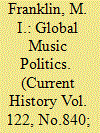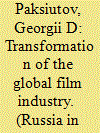| Srl | Item |
| 1 |
ID:
190945


|
|
|
|
|
| Summary/Abstract |
This article analyzes the significant events that led to the emergence and growth of the online Indian audio-visual sector. The principal argument that drives this narrative is the co-evolution of Indian formal and informal media economies that led to the media industries’ digital transformation. Drawing on historical analysis of the Indian film and television industries, we argue that just as the informal means of finance, social relations, illegal cable and satellite distribution had a formative influence on how these industries formalized, the Indian online audio-visual sector is driven by distinctive formalization processes, led by creators who are engaging with both local and global UGC-led platforms as well as PGC-led portals. Using a critical media industries framework, with data gathered from semi-structured interviews with ‘above-the-line’ Indian online media practitioners together with trade press literature, we propose an analytical framework that incorporates both platforms and portals as industrial objects for mapping digital production cultures that originate as inherently informal.
|
|
|
|
|
|
|
|
|
|
|
|
|
|
|
|
| 2 |
ID:
189698


|
|
|
|
|
| Summary/Abstract |
Music and politics have always been closely intertwined. Throughout history, political regimes have appropriated musical works for their own purposes, while musicians have expressed their own political views through their work—whether in the lyrics or in the music itself. Some pieces have become closely associated with certain political events, such as the fall of the Berlin Wall. Today, digital streaming services have brought a vast menu of global musical choices to consumers, but algorithmic recommendations could shape playlists in ways that serve political agendas or reinforce Western conventions.
|
|
|
|
|
|
|
|
|
|
|
|
|
|
|
|
| 3 |
ID:
179207


|
|
|
|
|
| Summary/Abstract |
The current rapid development of some Asian economies and the projected economic dominance of Asia in the 21st century are reasons enough to call it “the Asian century.” But will Asia’s economic growth entail an increase in political power and cultural influence? In this article the author looks at the topic through the lens of the film industry, a field of activity with a plethora of intertwined economic, political, and cultural factors. Cinema is studied here as an industry that produces “meanings” and is coupled with the concept of “strategic narratives.” According to some statistics, Asian cinema is becoming increasingly important in terms of the size of national film markets, but for a variety of reasons the U.S. remains the world’s most important exporter of motion pictures. The position of Asian countries in world cinematography is undermined by such global institutions as award ceremonies and film festivals that are held in the U.S. and Europe and tend to favor Western filmmakers. This article emphasizes the dramatic influence of digital transformation on modern cinematography and the opportunities it opens up for Asian film producers in creating a new, global streaming services market. Finally, the paper discusses development prospects for the film industries in four Asian leaders in this field—China, Japan, South Korea, and India. Japan and South Korea are likely to increase their cooperation with the U.S. in cinematography. There are great opportunities for cooperation between the film industries of India and China, but they are heavily dependent on political relations between the two nations. China’s film industry is expected to continue to develop rapidly.
|
|
|
|
|
|
|
|
|
|
|
|
|
|
|
|